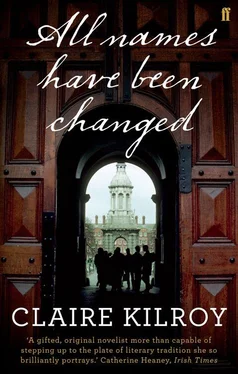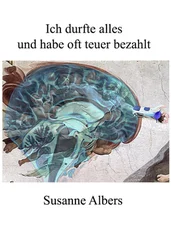Claire Kilroy - All Names Have Been Changed
Здесь есть возможность читать онлайн «Claire Kilroy - All Names Have Been Changed» весь текст электронной книги совершенно бесплатно (целиком полную версию без сокращений). В некоторых случаях можно слушать аудио, скачать через торрент в формате fb2 и присутствует краткое содержание. Год выпуска: 2010, Издательство: Faber & Faber, Жанр: Современная проза, на английском языке. Описание произведения, (предисловие) а так же отзывы посетителей доступны на портале библиотеки ЛибКат.
- Название:All Names Have Been Changed
- Автор:
- Издательство:Faber & Faber
- Жанр:
- Год:2010
- ISBN:нет данных
- Рейтинг книги:5 / 5. Голосов: 1
-
Избранное:Добавить в избранное
- Отзывы:
-
Ваша оценка:
- 100
- 1
- 2
- 3
- 4
- 5
All Names Have Been Changed: краткое содержание, описание и аннотация
Предлагаем к чтению аннотацию, описание, краткое содержание или предисловие (зависит от того, что написал сам автор книги «All Names Have Been Changed»). Если вы не нашли необходимую информацию о книге — напишите в комментариях, мы постараемся отыскать её.
All Names Have Been Changed — читать онлайн бесплатно полную книгу (весь текст) целиком
Ниже представлен текст книги, разбитый по страницам. Система сохранения места последней прочитанной страницы, позволяет с удобством читать онлайн бесплатно книгу «All Names Have Been Changed», без необходимости каждый раз заново искать на чём Вы остановились. Поставьте закладку, и сможете в любой момент перейти на страницу, на которой закончили чтение.
Интервал:
Закладка:
The group backed up into the workshop when they heard the door on the ground floor slam. They resumed their seats with lowered eyes, their defection foiled. Glynn had put a halt to their gallop. I will not say I wasn’t pleased to see them chastened. I threw a triumphant glance back at your man in the corner, suddenly my ally, but Mike didn’t register my smirk. He couldn’t take his eyes off the workshop door. The footsteps were getting louder.
We froze when Glynn at last appeared — you would think he had pulled a gun on us. He paused in the doorway to consider the room and its occupants. Glynn was never a big enough name for him. Hieronymus Bosch, he should have been called. Lucas Cranach the Elder. I was transfixed, as bad as the rest of them. His sheer tangibility was more than I’d bargained for.
He walked to the top of the room and pulled out the chair from the large desk, frowning at it as if it fell far short of his expectations. Still he hadn’t spoken a word. Finally he threw down his bulk and faced us. The silence at that point was absolute. It was not a formal silence, but a stricken one. We agreed later how alarming it had been the way he’d just sat there glaring at us like that, with such forthright disdain, such open contempt, and for such a protracted period of time too. The lot of us were in a rush to discuss him, to blurt our first impressions the second his back was turned, but while the man himself sat entrenched before us, we couldn’t have opened our mouths if we’d tried to.
Glynn leaned back in the chair the better to get a good look at us. He folded his arms over his chest, which rose and fell soundlessly — he appeared to be panting, though he wasn’t out of breath, not that we could tell. Faye said she thought he was having a heart attack, then thought she was having one herself at this prospect. From the outset, he commanded this level of rapt, almost fearful, concern. He was a spectacle we watched, a visual installation. We never knew what to expect.
Glynn’s scornful gaze roved from one face to the next, sizing up who first to attack. Strange, how he singled the five of us out for special scrutiny, though there were seven students seated before him that first class. We like to think that he chose us. That’s what we like to think. He did not speak for the longest time, just stared at each of us in turn. Impossible to know what he was thinking during this interlude. Glynn’s mind was an object of fascination and some perplexity, a jellyfish washed up on a beach.
A jolt when his eyes met mine. To my shame, I couldn’t keep from blinking. That unnervingly silent bullfrog inflation and contraction of his chest — was he doing it on purpose? Was it a deliberate act of intimidation? There is every likelihood. My skin burned under the full force of his attention, but despite this uncomfortable proximity — intimacy, I almost called it — still I felt no closer to the artistic sensibility driving him, becoming instead only more aware of his remoteness, of the breadth of the gulf dividing us. I looked down at my notebook, my empty, unmarked notebook, unable to sustain his gaze.
When I raised my eyes again, Glynn had moved on. He was staring now at Guinevere, and Guinevere, more power to the girl, was staring right back. Aisling tilted her palms toward the great writer as if warming them at a fire. So she felt the heat radiating off him too.
The way he kept soundlessly panting like that, physically spent: I too wanted to be emptied out like him. Scraped clean of the seething mess within, granted the compensation of seeing it distilled into words, a life lived, an imagination quarried. Exorcisms, he had once called his books — demons that had been cast out to take form, hoisted up on bookshelves for all the world to see, a rack of carcasses in a butcher’s window.
‘What do you want from me?’ Glynn finally demanded, the words propelled at us as if he’d dealt them a belt of a hurl. The question highlighted a troubling discrepancy, one we had failed to anticipate. Glynn’s pre-eminence in our lives, the central role he had played, was such that, on some instinctive level, we expected him to recognise if not us, then our type. We had presumed he would understand innately what had driven us to his door, see that only he could help us with it and know it wasn’t something that could be communicated in a sentence, not by us at least.
When Glynn got no response, he tried another tack.
‘Why do you need me?’
‘We don’t need you,’ Antonia snapped, averting her face and presenting Glynn with a wing of ash-blonde hair. It was the first instance I recall of the pronoun ‘we’ being used to refer to the group. We don’t need you . The Anglo-Irish accent. Glynn won’t like that, I thought. Turned out I was wrong. He did like it, had liked it very much.
Glynn grunted. I thought for a second that he was going to stand up and leave, seeing as we didn’t need him after all. I think he thought so too. He spent a long while pulling at his earlobe. Antonia kept her face averted during this period; Aisling absorbed the bad vibes through her palms; Faye contemplated various avenues for making everything better, and Guinevere set her calm face in solemn preparation for whatever was to come. If Glynn left, he would not return, that much was plain.
‘Why do you want to write?’ he eventually asked, sighing to illustrate the excessive tolerance demanded of him by the situation. He nodded at the girl by the radiator, indicating that she should start. Sound choice, Professor Glynn. Selecting her had less to do with working from left to right than picking off the weakest first. Of the girl’s startled response (we never got her name) all I remember is ‘Well, um, because.’ It seemed Glynn was correct in his initial assessment that here sat a shower of messers.
I didn’t fare much better when my turn came. The question was designed to catch me out, to sift my dilettantism from his authenticity. Glynn had railed publicly against the notion that everyone had a novel in them, appearing to instead believe that he held the Irish monopoly on the form. This had earned him no friends amongst that contingent who slept with draft manuscripts inspired by the War of Independence under their mattresses, that standing army of ten thousand or so, and counting.
Well we knew that Glynn could make words do whatever he wished them to, could turn our words against us with a flick of the wrist, and perhaps this accounts for the reticence and caution with which we navigated his question that afternoon. Except for Antonia. Her answer alone stood out that day, both for the content and stark gravity of her delivery. Sadness progressively descended upon the room with her every word, falling, falling, weighing down our bodies like a blanket of snow. When she was finished, it was difficult to move.
She spoke in brief cogent sentences and never once had to cast about for the correct term, knowing already which words to apply, as if they were laid out on the desk before her. She picked them up and put them down again as though talking us through a selection of historical artefacts. If Glynn’s intention had been to send us skulking away in humiliation, well then, he had met his match. Antonia, face averted, nothing left to lose. I transcribe her answer, what I remember of it, in full, more or less, give or take:
7 Deirdre of the Sorrows
‘I am thirty-nine years old now,’ Antonia began, and lowered her head as if this were a shameful admission. ‘My mind is full of fragments of roads travelled. I cannot remember the journeys themselves. I do not recall the destinations. On these journeys, it is always dusk, and I am always strapped into the passenger seat of a car, staring out the window. Someone to my right, a man, is driving. I assume it is my ex-husband, but I have no real sense of his presence. It could be my dead father. It could be a stranger. We travel along the road in silence. The only sound is the drone of the engine. It is warm inside the car, but outside it looks inhospitable, too inhospitable to survive the night.
Читать дальшеИнтервал:
Закладка:
Похожие книги на «All Names Have Been Changed»
Представляем Вашему вниманию похожие книги на «All Names Have Been Changed» списком для выбора. Мы отобрали схожую по названию и смыслу литературу в надежде предоставить читателям больше вариантов отыскать новые, интересные, ещё непрочитанные произведения.
Обсуждение, отзывы о книге «All Names Have Been Changed» и просто собственные мнения читателей. Оставьте ваши комментарии, напишите, что Вы думаете о произведении, его смысле или главных героях. Укажите что конкретно понравилось, а что нет, и почему Вы так считаете.












